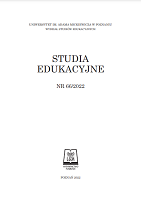REIMAGINING EDUCATION TOWARDS SUSTAINABILITY. “PROJECT X” – AN INNOVATIVE LEARNING STRATEGY FROM POLAND
REIMAGINING EDUCATION TOWARDS SUSTAINABILITY. “PROJECT X” – AN INNOVATIVE LEARNING STRATEGY FROM POLAND
Author(s): Aneta Rogalska-MarasińskaSubject(s): School education, Educational Psychology, State/Government and Education, Inclusive Education / Inclusion, Sociology of Education
Published by: Uniwersytet Adama Mickiewicza
Keywords: pre service and in-service teacher training; teaching-learning curriculum; deep learning; experiential learning; futures of education, ESD; innovative learning strategy;
Summary/Abstract: The paper presents arguments on profound and diverse student-teacher education concentrated on sustainable development as a rational way to combat Anthropocene damage and destruction. It means coping with destructive ecological changes and, more widely, with social deformations that revised educational approaches and paradigms may heal. They refer to the concept of reimagination in education. Thus, there is a considerable need to work out some valid, understandable and socially accepted teaching-learning pedagogies that would make the process of student-teacher education comply with contemporary and future expectations and challenges. Making the idea of “Think globally, act locally” practically achievable, present and future teachers should learn to perceive each school/academic topic as a multifaceted issue, referring to the four pillars of sustainable education. It entails using some new concepts of professional development, like deep learning or experiential learning, along with the awareness of the future of education. A new social contract for education considers the circular process of human development and ecological re-growth, which needs to introduce truly “holistic strategies”. They refer to six global competencies (Character, Citizenship, Collaboration, Communication, Creativity, and Critical Thinking) and five principles of student-teacher growth (Combination of pedagogies, Connoisseurship of expert teachers and learning communities, Content inherent in all teaching and learning, The reach of context, and Making change happen) as well as to some earlier sustainability transformation concepts included in sustainable development documents from previous decades. While the conviction of teachers’ undeniable role in building a more balanced life is constantly increasing, processes of student-teacher education for sustainability are too slow. They have to accelerate and receive priority. Such approaches need to rethink course curricula and syllabi and “make” teachers assume a new and varied perspective on planning, implementation and assessment. One of them is the eponymous “Project X”, which refers to the concept of Project Y suggested in some UNESCO teacher manuals and first mentioned during DESD. It enlarges the three-dimension perspective by adding the cultural pillar. The issue of perceiving a teaching-learning problem simultaneously from four perspectives (natural, cultural, social, and economic) enhances the range of possible questions and interpretations, evokes deeper individual reflection, and refers to students’ life experiences and expectations. Planning such a highly complex and complementary teaching-learning strategy motivates students (present-day and prospective teachers) to engage them in learning and makes the work more intriguing and challenging. The presentation of a sample of the “Project X” realisation as an example of an innovative learning strategy proves education’s strength and creative possibilities for sustainable development in teacher learning as constructive, beneficial and fruitful pedagogical approaches.
Journal: Studia Edukacyjne
- Issue Year: 2022
- Issue No: 66
- Page Range: 17-34
- Page Count: 18
- Language: English

